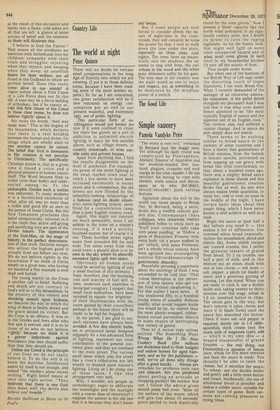The Good Life
Simple saucery
Pamela Vandyke Price
"The world is very evil," remarked St Bernard (not the doggy one). Yet although his daily round was complicated by Plantagenets, Abelard, Eleanor of Aquitaine and her monkish-minded first husband, plagues, crusades and wolf tracks in the crus classes, I do not recollect his having to cope with sheikhs, trade unions and discussions as to who did/didn't, should/shouldn't push various buttons.
Agitation about the evil in the world can cause people to Break Out. St Bernard, being a saint, broke into a twelfth century golden disc. Contemporary chers collegues, who otherwise restrict published follies to trivia such as 'Stuff your crinoline lady cake with pease pudding,' or 'Endow a glass of Beaujolais Primeur with extra body via a prune soaked in gin' (which, with some Primeurs, isn't a wholly trivial notion), have been agitated into promulgating positive Gotterdammerungs of gastronomic absurdity.
Peacefully perusing a paperback .about the sociology of food, I was astounded to be told that "Oral coitus interruptus is the perversion of wine tasters, who spit out the food without swallowing it." For this author I have news. If you swallowed fifty to a hundred young wines of possibly dubious quality, what would happen inside you would be far, far nastier than the most plastic-wrapped, rubberbound sexual perversion; there'd be scant chance of interrupting that variety of gutrot.
Then lot A review copy arrives entitled The Something Went Wrong What Do I Do Now Cookery Book (the authors are doubtless kind to their budgies and endow homes for aged hamsters, and as for the publishers — well, we've all done silly things after a good lunch) ... Herein are , remedies for problems both rare and obscure. Are you perplexed about peeling an avocado or chopping parsley? Me neither. Nor can I follow the advice given should pasta boil over: "blow on the surface of the water, which will give you about 15 seconds' grace period to look frantically
round for the oven gloves." Now I possess a 'blow' capacity like the north wind portrayed in an eighteenth century print, but I doubt its power to calm the raging tagliatelle. As for the frantic look, that might well light on some other unexpected hazard and of what avail oven gloves in such circs? In my Neanderthal kitchen I'd turn off the source of heat.
Thus people under stress. But when one of the bastions of our British Way of Life sags under
the distorting touch of toque blancherie, I too must Break Out. What. I recently demanded of the manager of an otherwise admirable restaurant, is the pallid drivel alongside my pheasant? And I was told that it was what even Andre Simon admitted to be "the most typically English of sauces and the supreme test of an English cook." This version, alas, had suffered a cuisine change. And la sauce du pain simply does not march.
There seems to be nothing similar to bread sauce in the cookery of other countries and I have a theory that generations of British nannies, from the hennin to bonnet epochs, prevented us from sopping up our gravy with bread like little continentals, so that, about a hundred years ago, there was a mighty bread sauce explosion in these islands and this beautiful gastronomic creation Broke Out as well. As one who always makes treble quantities, to enjoy hot, cold or even on toast in the middle of the night, I have certain basic ideas about this simple thing, which I have never known a chef achieve as well as a cook.
Begin the sauce at least half a day before you need it — this makes a lot of difference. Use trimmed white bread (naturally, eschew the steambaked, sliced and plastic ilk). Some oldish recipes use toasted crumbs, but I prefer the granular texture of grated fresh bread. To 2 oz crumbs, use half a pint of milk, and in this mixture put an onion, stuck with one or two cloves — not more — .salt, pepper, a pinch (or blade) of mace, and a generous grating of nutmeg. Let this stand. When you are ready to cook it, use a double boiler and, taking twenty to thirty minutes over this stage, whisk in 1-2 oz. unsalted butter in chips. The onion gets in the way, but don't remove it (plus cloves and mace if in blade form) until the sauce has absorbed the butter.
Check if more salt and pepper is required, slowly stir in 1-2 tablespoonfuls thick cream (not the mock milk of magnesia type), add — which is my own idea — a heaped teaspoonful of grated Gruyere — the real* thing, not Emmenthal—a squeeze of lemon
Juice, whisk for five more minutes and then the sauce is ready. You shouldn't be able to taste the cheese, but it enriches the sauce.
To reheat, use the double boiler and gently add a little more butter and cream. Incidentally, the use of wholemeal bread is possible and makes a solider sauce, suitable for certain types of game. Both versions are calming pleasures in trying times.


























 Previous page
Previous page